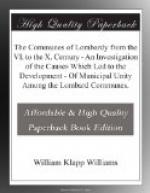It was a period of utter stagnation, of suspension of life, but the source remained intact, from which, by the evolution of events and the progress of time, seeds were to spring that only needed external pressure to force them into a growth, slow indeed but certain, and in the end fruitful. A transition period we might call it. The theory of Roman universal domination, by relegating to the central power all the political functions of the municipality and leaving it only its civic ones, and these in later imperial times grudgingly and with an impaired independence, had left it simply an administrative instead of a political division of the state. In the flush of triumph the rough hand of the barbarian overthrew the framework of administration, and at first failed to recognize the necessity of replacing it by any other. The passivity of the conquered inhabitants—the cause of which has already been explained—was such that a long period elapsed before they realized that to regain in some measure the position of local independence that they had lost, and to free themselves from the shackles of dependence on the rural communities in which they were placed—a dependence forced upon them by the natural development of the new state system of their Teutonic conquerors—some common effort at organization was needful, for purposes at least of self-defense. That this effort came from the town itself, from the people and not from the external power of the ruler or overlord, is the fact which first makes the history of these municipalities interesting.
There are two facts, however, which, even at this early date, begin to influence the internal history of the communes. These are the influence which the Church,[7] through its bishops, began to attain in the civil affairs of the country; and the idea beginning to gain currency that the locality where a number of individuals, however wretched in state, were collected together, would afford a safer refuge than the open country to the oppressed, the homeless and the outcast. I will briefly consider the latter first, as of less importance, though not unconnected with the former.
In the period of great confusion in all relations of property which ensued from the Lombard military system of small independent landholders and a few great overlords, with a nominal royal ownership of title, and before the feudal system was established, with its iron rules in regular working order, constant inequalities of wealth and consequent changes in the relative positions of individuals were sure to ensue. In practice if not in theory, might makes right in such a state of society. The weaker goes to the wall, and the stronger gains in strength by his downfall. Besides, it was long before the roving and predatory instinct of the barbarian was moderated; and his weaker neighbor was the natural prey of the more powerful landholder, an example not unfrequently set by the king himself. Now, if the weaker party remained




